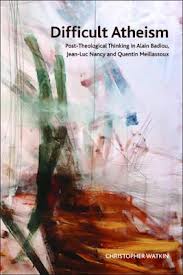Take a moment to read the following excerpts from Chris Watkin's
DIfficult Atheism book. After summing up the spectral dilemma and M's theory of the fourth world, Watkin makes some interesting (and accurate, I think) observations.
“Unwiling to sacrifice the hope for universal justice, even
for the dead, Meillassoux splits the horns of a/theism’s unsatisfying dilemma
[either God exists or not] by introducing the position he calls ‘the
philosophical divine.’ Like the
religious believer, the philosopher believes in God, and can therefore claim as
their own religious hope for universal justice; like the atheist, the
philosopher denies the existence of God, and so is not saddled with having to
charge current injustice to God’s account.”
“Meillassoux’s philosophy, as we have seen, embraces a
messianic hope for justice. Unlike the
nihilist, who hopes for justice in another life, the philosopher hopes for
immortality in this life (immortality, this time, in the sense of living
forever)….But in what sense does the philosopher hope for immortality in this
life?....Everything that is logically possible is really possible, including
the rebirth of bodies.”
“Meillassoux couches his hope in his teleological narrative
of four Worlds…the fourth World, the World of Justice and the world of the
rebirth of man, is the world in which humanity acquires immortality, which
Meillassoux argues is the only life worthy of the human condition….If there is
to be universal justice we must be born again, because only the rebirth of man
makes possible universal justice up to and including the injustice of a life
snatched away.”
“When it comes to how such a justice will arrive,
Meillassoux’s occupation with religious territory is even more pronounced….[A]
mediator called variously by Meillassoux the Child of Man, or [son of] God, receives
the power to produce the rebirth necessary for justice by the same appearing ex nihilo that brought life from matter
(World two) and rational intelligence from life (World three)…..[In this way] we
are God’s ancestors and not his creatures.”
“[The stages and institution of a fourth World of Justice]
traces for Meillassoux an inverted Christic Hegelianism. In Hegel’s notion of God in the Science of Logic, the infinity of God
requires that He pass into finitude, becoming contingent, limited and
incarnate, in order that finitude itself be overcome as the limit of the
infinite. But the inclusion of the
finite in the infinite cannot be definitive, because then the infinite would be
finite. The finite must be a moment of the infinite. The Christ must die, in order to assure the
dialectic movement infinite – finite – infinite, or God – man – God. In this Hegelian conception, contingency is
subordinated to the real necessity of the All.
With Meillassoux’s Child of Man we see this process reversed. Contingency itself is an expression
necessity, and rather than finitude being dialectically overcome in the One-All
of divine infinity, divinity itself is brought under the one universal condition
of contingency in the dialectic of finite – infinite – finite, or man – God –
man. While Meillassoux shares with Hegel
the intuition of the Christic character of the rational, the terms are
reversed.”
“Meillassoux argues that with this inverted Christic
Hegelianism, Man is no longer denigrated, as in religion and atheism alike, but
neither is he elevated to a dangerous Promethean pedestal. Promethean humanism is nothing but the
religious vision that man makes of and for himself (promé-théisme or “Prome-theism), an instance of what we are
calling imitative atheism that makes an idolatry of the power of man instead of
the power of God…..In this, Meillassoux’s ethics structurally bears much in common with a
Christianity that looks to Jesus the Son of Man for its ethical paradigm. To make this comparison is not to threaten
Meillassoux’s thought with parasitism, however, for this is precisely his aim.”
